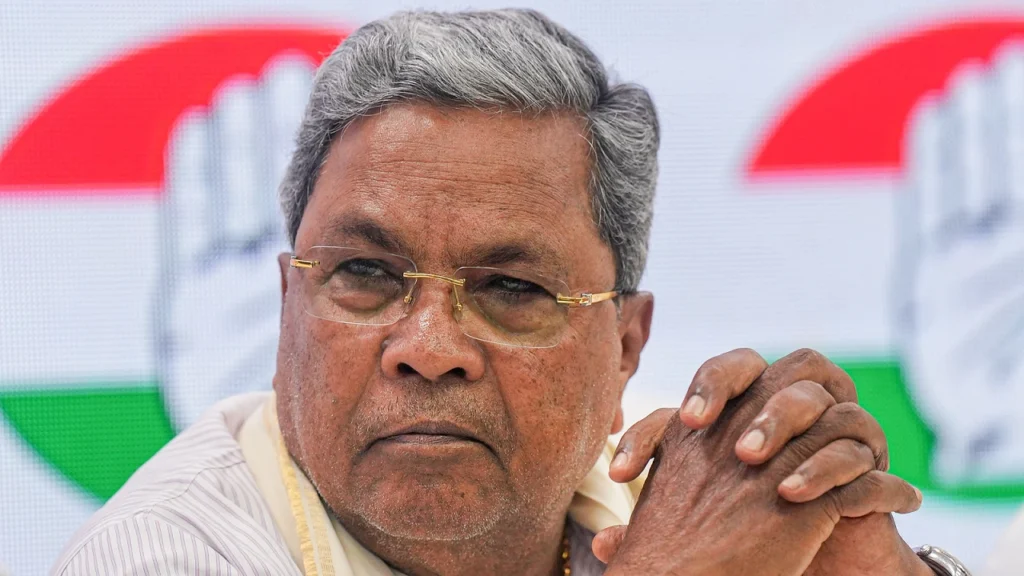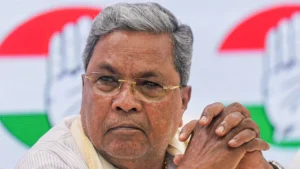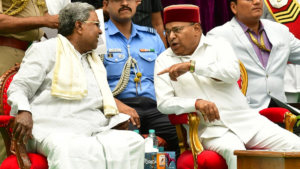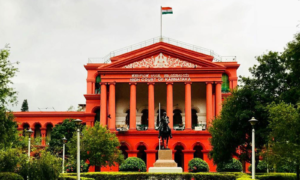
“High Court Ruling Paves Way for Investigation Against Siddaramaiah in MUDA Case”

Big Setback for Siddaramaiah: Karnataka High Court Upholds Governor’s Action
In a significant legal development, the Karnataka High Court has dismissed Chief Minister Siddaramaiah’s plea challenging the Governor’s sanction to prosecute him in the alleged Mysore Urban Development Authority (MUDA) land scam case. This ruling marks a critical moment in the ongoing controversy surrounding allegations of corruption linked to land allocations involving Siddaramaiah’s family.
Court Ruling and Key Observations
On September 24, 2024, Justice M Nagaprasanna delivered the verdict, affirming that Governor Thawar Chand Gehlot acted within his rights and exercised due diligence in approving the investigation against Siddaramaiah. The court stated that the Governor’s decision did not suffer from “non-application of mind” and emphasized that the facts presented warranted further investigation. Justice Nagaprasanna remarked:
“The facts narrated in the petition would undoubtedly require an investigation… There is no fault in the Governor’s actions.”
The court also noted that it is the responsibility of private complainants to seek approval for such investigations under Section 17A of the Prevention of Corruption Act, which was upheld in this case.
Background of the MUDA Case
The allegations against Siddaramaiah stem from claims that compensatory land parcels were improperly allocated to his wife, BM Parvathi, in a prime area of Mysuru. The controversy revolves around:
- Land Allotment: In 2021, MUDA granted 14 premium sites to Parvathi as compensation for a 3.16-acre plot acquired by the government. Activists allege that these sites were valued significantly higher than the original land.
- Irregularities: Critics assert that this allocation led to a loss of approximately ₹45 crore to the state exchequer, prompting complaints from social activists and political opponents.
Legal Proceedings and Reactions
Siddaramaiah had sought to quash the Governor’s sanction, arguing that it was unconstitutional and lacked justification. His legal team contended that such actions required Cabinet approval, asserting that the Governor should not act independently without ministerial advice. However, the court rejected these arguments, reinforcing the Governor’s authority to initiate investigations in exceptional circumstances.In response to the ruling, Siddaramaiah stated he would not shy away from facing any probe and maintained that he had done nothing wrong. He characterized the allegations as politically motivated attempts to undermine his leadership.
Implications for Siddaramaiah
This ruling represents a significant setback for Siddaramaiah, as it opens the door for potential legal proceedings against him in connection with the MUDA case. The court’s affirmation of the Governor’s sanction could lead to further scrutiny of his actions during his previous tenure as Chief Minister.Political analysts suggest that this development may impact Siddaramaiah’s standing within his party and among voters, particularly as Karnataka approaches future elections. The Bharatiya Janata Party (BJP), which has been vocal in its demands for Siddaramaiah’s resignation and a Central Bureau of Investigation (CBI) probe, may leverage this situation to strengthen its position.

Next Steps for Siddaramaiah After the Karnataka High Court’s Ruling
The Karnataka High Court’s dismissal of Chief Minister Siddaramaiah’s plea challenging the Governor’s sanction to prosecute him in the alleged MUDA land scam case marks a significant setback for him. With this ruling, Siddaramaiah faces the prospect of potential legal proceedings and further scrutiny of his actions. Here are the key next steps he may consider:
1. Exploring Legal Options
Siddaramaiah can choose to appeal the High Court’s decision in the Supreme Court. However, legal experts suggest that overturning this order will be an uphill battle, given the court’s strong observations affirming the Governor’s actions.
2. Responding to Investigative Agencies
With the High Court’s green light, investigative agencies like the Anti-Corruption Bureau (ACB) or the Central Bureau of Investigation (CBI) may soon summon Siddaramaiah for questioning and initiate formal proceedings against him. He will need to cooperate with these agencies while preparing his defense.
3. Addressing Political Fallout
The BJP has already called for Siddaramaiah’s resignation and a CBI probe into the matter. He will need to navigate the political implications of this case, both within his party and in the public eye. Siddaramaiah may face pressure to step down, at least temporarily, to allow for an impartial investigation.
4. Mounting a Robust Defense
Siddaramaiah will have to build a strong legal case to counter the allegations against him and his family members. This may involve challenging the premise of the case, questioning the evidence, and highlighting any procedural irregularities in the investigation process.
5. Communicating with Constituents
As the face of the Congress party in Karnataka, Siddaramaiah will need to address his supporters and the public at large. He may seek to portray the case as a politically motivated witch-hunt and rally support by emphasizing his government’s achievements.

How might this ruling impact Siddaramaiah’s political career
Impact of the Karnataka High Court Ruling on Siddaramaiah’s Political Career
The recent ruling by the Karnataka High Court, which dismissed Chief Minister Siddaramaiah’s plea challenging the Governor’s sanction for his prosecution in the MUDA land scam case, represents a significant turning point in his political career. This decision not only jeopardizes his position but also raises critical questions about his future within the Congress party and Karnataka’s political landscape.
1. Reputation and Credibility at Stake
Siddaramaiah has built a political career spanning over 50 years, but this ruling has dealt a severe blow to his reputation. The allegations of corruption linked to land allotments involving his family have intensified scrutiny and could tarnish his legacy. As public perception shifts, maintaining credibility will be a significant challenge for him.
2. Increased Pressure from Opposition
The opposition parties, particularly the BJP and Janata Dal (Secular), have intensified their calls for Siddaramaiah’s resignation following the court’s decision. BJP leaders have openly demanded that he step down to allow for an impartial investigation into the allegations. This mounting pressure could create internal strife within the Congress party, as party members may be forced to take sides.
3. Potential Legal Consequences
With the court ruling allowing investigative agencies to proceed with their inquiries, Siddaramaiah faces the possibility of being formally charged with corruption. This could lead to legal proceedings that may further complicate his ability to govern effectively. If he is summoned for questioning or indicted, it could undermine his authority and effectiveness as Chief Minister.
4. Internal Party Dynamics
While Deputy Chief Minister D.K. Shivakumar has publicly supported Siddaramaiah, there are rumors of potential leadership challenges within the Congress party. Should Siddaramaiah’s legal troubles escalate, it might create an opening for rivals within the party to position themselves as viable alternatives for leadership. The Congress high command may also face pressure to reassess Siddaramaiah’s role in light of the ongoing controversy.
5. Strategic Response Required
Siddaramaiah’s next steps will be crucial in determining his political future. He can choose to appeal the High Court’s decision in higher courts, which may provide temporary relief but could also prolong uncertainty around his leadership. Additionally, he must effectively communicate with constituents and party members to mitigate any fallout from this ruling.

HIGH COURT
According to the Karnataka High Court’s ruling, the Governor’s sanction to prosecute Chief Minister Siddaramaiah in the alleged MUDA land scam case was justified and does not suffer from any lack of application of mind. The key points from the High Court’s decision are:
- The Governor acted within his rights by granting sanction to the private complainants to file corruption cases against Siddaramaiah. The court said this was an exceptional circumstance where the Governor could take an independent decision, not bound by the aid and advice of the Council of Ministers.
- The facts presented in the case warrant an investigation, as the beneficiary of the alleged irregularities is Siddaramaiah’s own family. The court stated that only a probe can reveal if corruption was involved in the land grant to his wife by MUDA.
- The High Court dismissed Siddaramaiah’s plea seeking to quash the Governor’s sanction order. It ruled that the order does not suffer from “non-application of mind” and there is “no fault” with the Governor’s decision.
- The court said the private complainants were justified in seeking sanction from the Governor under Section 17A of the Prevention of Corruption Act. It is their duty to seek such approval, not a police officer’s.
- The High Court rejected Siddaramaiah’s argument that the Governor’s sanction was legally unsustainable, procedurally flawed and motivated by extraneous considerations.
In summary, the Karnataka High Court has upheld the Governor’s sanction, paving the way for investigative agencies to proceed with the probe against Siddaramaiah in the MUDA land scam case. The ruling represents a major setback for the Chief Minister.
Conclusion
The Karnataka High Court’s ruling, which allows for the prosecution of Chief Minister Siddaramaiah in the MUDA land scam case, poses significant challenges to his political career. This decision not only jeopardizes his reputation but also invites increased scrutiny from opposition parties and raises questions about his leadership within the Congress party. As he faces potential legal consequences and mounting pressure to resign, Siddaramaiah’s ability to navigate these turbulent waters will be crucial.The coming weeks will be pivotal as he must balance legal strategies, manage internal party dynamics, and communicate effectively with his constituents to mitigate any fallout. Ultimately, how Siddaramaiah responds to this ruling will determine whether he can maintain his position as Chief Minister or if this marks a turning point that could lead to his political decline. The situation underscores the complexities of political accountability in India and sets the stage for a critical chapter in Karnataka’s political landscape.
Discover more from
Subscribe to get the latest posts sent to your email.






